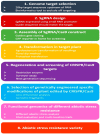Impact of Climate Change on Crops Adaptation and Strategies to Tackle Its Outcome: A Review
- PMID: 30704089
- PMCID: PMC6409995
- DOI: 10.3390/plants8020034
Impact of Climate Change on Crops Adaptation and Strategies to Tackle Its Outcome: A Review
Abstract
Agriculture and climate change are internally correlated with each other in various aspects, as climate change is the main cause of biotic and abiotic stresses, which have adverse effects on the agriculture of a region. The land and its agriculture are being affected by climate changes in different ways, e.g., variations in annual rainfall, average temperature, heat waves, modifications in weeds, pests or microbes, global change of atmospheric CO₂ or ozone level, and fluctuations in sea level. The threat of varying global climate has greatly driven the attention of scientists, as these variations are imparting negative impact on global crop production and compromising food security worldwide. According to some predicted reports, agriculture is considered the most endangered activity adversely affected by climate changes. To date, food security and ecosystem resilience are the most concerning subjects worldwide. Climate-smart agriculture is the only way to lower the negative impact of climate variations on crop adaptation, before it might affect global crop production drastically. In this review paper, we summarize the causes of climate change, stresses produced due to climate change, impacts on crops, modern breeding technologies, and biotechnological strategies to cope with climate change, in order to develop climate resilient crops. Revolutions in genetic engineering techniques can also aid in overcoming food security issues against extreme environmental conditions, by producing transgenic plants.
Keywords: climate change; crop adaptation; genetic engineering; genome wide association studies (GWAS); hormone responses; marker-assisted selection (MSA); molecular breeding; physiological responses.
Conflict of interest statement
The authors declare no conflict of interest.
Figures







References
-
- Arunanondchai P., Fei C., Fisher A., McCarl B.A., Wang W., Yang Y. The Routledge Handbook of Agricultural Economics. Routledge; Abingdon-on-Thames, UK: 2018. How does climate change affect agriculture.
-
- Noya I., González-García S., Bacenetti J., Fiala M., Moreira M.T. Environmental impacts of the cultivation-phase associated with agricultural crops for feed production. J. Clean. Prod. 2018;172:3721–3733. doi: 10.1016/j.jclepro.2017.07.132. - DOI
-
- Vaughan M.M., Block A., Christensen S.A., Allen L.H., Schmelz E.A. The effects of climate change associated abiotic stresses on maize phytochemical defenses. Phytochem. Rev. 2018;17:37–49. doi: 10.1007/s11101-017-9508-2. - DOI
-
- FAO. UNICEF. WFP. WHO . The State of Food Security and Nutrition in the World 2017: Building Resilience for Peace and Food Security. Food and Agriculture Organization of the United Nations (FAO); Rome, Italy: 2018.
-
- Rosenzweig C., Elliott J., Deryng D., Ruane A.C., Müller C., Arneth A., Boote K.J., Folberth C., Glotter M., Khabarov N. Assessing agricultural risks of climate change in the 21st century in a global gridded crop model intercomparison. Proc. Natl. Acad. Sci. USA. 2014;111:3268–3273. doi: 10.1073/pnas.1222463110. - DOI - PMC - PubMed
Publication types
Grants and funding
LinkOut - more resources
Full Text Sources
Other Literature Sources

